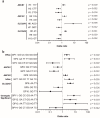Genetic Variants of ABC and SLC Transporter Genes and Chronic Myeloid Leukaemia: Impact on Susceptibility and Prognosis
- PMID: 36077209
- PMCID: PMC9456284
- DOI: 10.3390/ijms23179815
Genetic Variants of ABC and SLC Transporter Genes and Chronic Myeloid Leukaemia: Impact on Susceptibility and Prognosis
Abstract
Solute carrier (SLC) and ATP-binding cassette (ABC) transporters comprise a variety of proteins expressed on cell membranes responsible for intrusion or extrusion of substrates, respectively, including nutrients, xenobiotics, and chemotherapeutic agents. These transporters mediate the cellular disposition of tyrosine kinase inhibitors (TKIs), and their genetic variants could affect its function, potentially predisposing patients to chronic myeloid leukaemia (CML) and modulating treatment response. We explored the impact of genetic variability (single nucleotide variants-SNVs) of drug transporter genes (ABCB1, ABCG2, SLC22A1, and SLC22A5) on CML susceptibility, drug response, and BCR-ABL1 mutation status. We genotyped 10 SNVs by tetra-primers-AMRS-PCR in 198 CML patients and 404 controls, and assessed their role in CML susceptibility and prognosis. We identified five SNVs associated with CML predisposition, with some variants increasing disease risk, including TT genotype ABCB1 (rs1045642), and others showing a protective effect (GG genotype SLC22A5 rs274558). We also observed different haplotypes and genotypic profiles associated with CML predisposition. Relating to drug response impact, we found that CML patients with the CC genotype (rs2231142 ABCG2) had an increased risk of TKI resistance (six-fold). Additionally, CML patients carrying the CG genotype (rs683369 SLC22A1) presented a 4.54-fold higher risk of BCR-ABL1 mutations. Our results suggest that drug transporters' SNVs might be involved in CML susceptibility and TKI response, and predict the risk of BCR-ABL1 mutations, highlighting the impact that SNVs could have in therapeutic selection.
Keywords: CML; TKI resistance; cancer predisposition; drug transporters.
Conflict of interest statement
The authors declare no conflict of interest.
Figures


Similar articles
-
Instability of mRNA expression signatures of drug transporters in chronic myeloid leukemia patients resistant to imatinib.Oncol Rep. 2013 Feb;29(2):741-50. doi: 10.3892/or.2012.2153. Epub 2012 Nov 28. Oncol Rep. 2013. PMID: 23229016
-
Clinical relevance of a pharmacogenetic approach using multiple candidate genes to predict response and resistance to imatinib therapy in chronic myeloid leukemia.Clin Cancer Res. 2009 Jul 15;15(14):4750-8. doi: 10.1158/1078-0432.CCR-09-0145. Epub 2009 Jul 7. Clin Cancer Res. 2009. PMID: 19584153
-
Pharmacogenetics of BCR/ABL Inhibitors in Chronic Myeloid Leukemia.Int J Mol Sci. 2015 Sep 21;16(9):22811-29. doi: 10.3390/ijms160922811. Int J Mol Sci. 2015. PMID: 26402671 Free PMC article. Review.
-
Tyrosine kinase inhibitor resistance in chronic myeloid leukemia cell lines: investigating resistance pathways.Leuk Lymphoma. 2011 Nov;52(11):2139-47. doi: 10.3109/10428194.2011.591013. Epub 2011 Jun 30. Leuk Lymphoma. 2011. PMID: 21718141
-
New Insights into the Molecular Resistance Mechanisms of Chronic Myeloid Leukemia.Curr Cancer Drug Targets. 2016;16(4):323-45. doi: 10.2174/1568009615666150921141004. Curr Cancer Drug Targets. 2016. PMID: 26391311 Review.
Cited by
-
Influence of CYP2C8*3 and ABCG2 C421A genetic polymorphisms on trough concentration and molecular response of imatinib in Egyptian patients with chronic myeloid leukemia.Cancer Chemother Pharmacol. 2024 Dec 23;95(1):12. doi: 10.1007/s00280-024-04723-y. Cancer Chemother Pharmacol. 2024. PMID: 39714624 Free PMC article.
-
Prenatal opioid exposure significantly impacts placental protein kinase C (PKC) and drug transporters, leading to drug resistance and neonatal opioid withdrawal syndrome.Front Neurosci. 2024 Aug 19;18:1442915. doi: 10.3389/fnins.2024.1442915. eCollection 2024. Front Neurosci. 2024. PMID: 39238930 Free PMC article.
-
Genetic Variants in Oxidative Stress-Related Genes and Their Impact on Prognosis and Treatment Response in Chronic Myeloid Leukemia Patients.Int J Mol Sci. 2025 Jun 13;26(12):5682. doi: 10.3390/ijms26125682. Int J Mol Sci. 2025. PMID: 40565143 Free PMC article.
-
Computational Characterization of Membrane Proteins as Anticancer Targets: Current Challenges and Opportunities.Int J Mol Sci. 2024 Mar 26;25(7):3698. doi: 10.3390/ijms25073698. Int J Mol Sci. 2024. PMID: 38612509 Free PMC article. Review.
-
Advances in the structure, mechanism and targeting of chemoresistance-linked ABC transporters.Nat Rev Cancer. 2023 Nov;23(11):762-779. doi: 10.1038/s41568-023-00612-3. Epub 2023 Sep 15. Nat Rev Cancer. 2023. PMID: 37714963 Review.
References
-
- Fattah S., Shinde A.B., Matic M., Baes M., van Schaik R.H.N., Allegaert K., Parmentier C., Richert L., Augustijns P., Annaert P. Inter-Subject Variability in OCT1 Activity in 27 Batches of Cryopreserved Human Hepatocytes and Association with OCT1 mRNA Expression and Genotype. Pharm. Res. 2017;34:1309–1319. doi: 10.1007/s11095-017-2148-9. - DOI - PubMed
MeSH terms
Substances
Grants and funding
LinkOut - more resources
Full Text Sources
Medical
Miscellaneous

